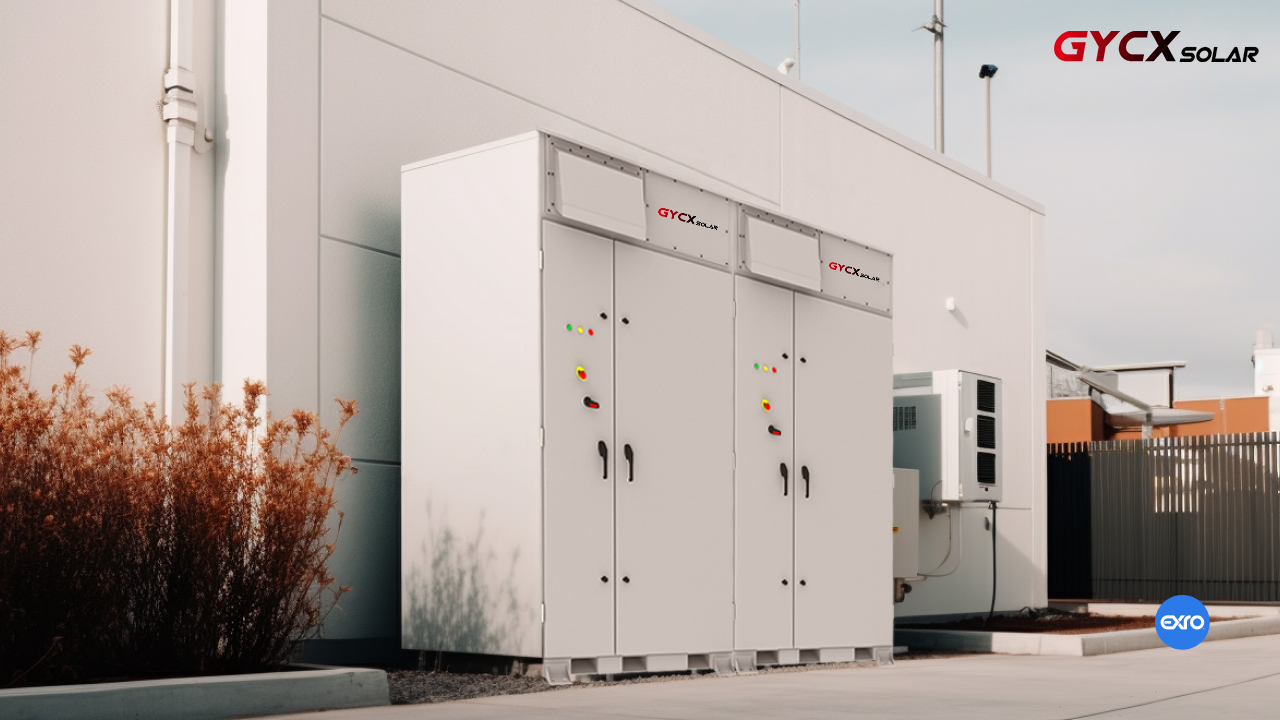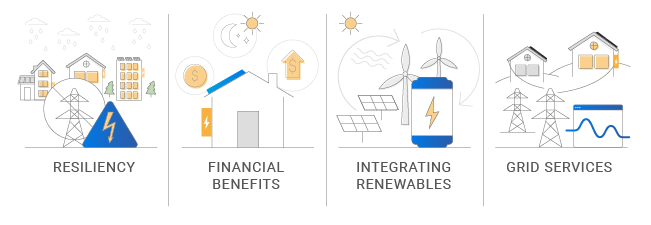
Na era de hoje, a indústria de energia está enfrentando cada vez mais desafios, e os consumidores querem produtos mais limpos, eletricidade confiável e acessível. Cada vez mais empresas estão recorrendo a tecnologias solares e de armazenamento para reduzir despesas de demanda e otimizar o gerenciamento de custos de energia.
O armazenamento comercial de baterias é uma ferramenta comum de gerenciamento de custos de energia, e a sua utilização em combinação com tecnologias renováveis, como a energia solar comercial, pode ajudar as empresas a resistir às flutuações nos custos de energia e a proteger os interesses comerciais. O dinheiro economizado com a instalação de armazenamento comercial de baterias pode ser investido no desenvolvimento de negócios, impulsionando ainda mais o crescimento da empresa.
O que é armazenamento de bateria comercial?
O armazenamento comercial de baterias é basicamente um grande tipo de armazenamento de energia dispositivo que normalmente colocamos fora dos edifícios. Se o dispositivo estiver conectado a um sistema solar fotovoltaico, pode ser carregado quando o sol está brilhando. No caso de baixa demanda de energia, também pode extrair eletricidade da rede à noite para carregar.

A bateria possui um recurso chamado Resposta de Estabilização de Frequência Dinâmica (DFFR), que monitora e libera a energia armazenada. O interior de uma célula solar é, na verdade, composto de muitos íons de lítio recarregáveis, que são armazenados em pequenas baterias dentro do dispositivo.
Quais são os benefícios do armazenamento comercial de baterias?
O uso de armazenamento de bateria comercial traz muitos benefícios. Em termos simples, o armazenamento da bateria permite armazenar energia e usá-la quando precisar. Envolve o uso de um sistema solar para carregá-lo e descarregá-lo à noite ou durante períodos de pico de demanda.. Combinando armazenamento de bateria com instalações solares comerciais, as empresas podem converter mais energia solar em eletricidade utilizável, aumentar a poupança através de energias renováveis e reduzir a dependência da rede.

Existem vários benefícios importantes na adoção do armazenamento comercial em bateria, Incluindo:
Aumentar a independência energética
Combinando armazenamento de bateria com instalações solares comerciais, as empresas conseguem armazenar o excesso de energia gerada durante o dia e utilizá-la fora dos horários de pico, reduzindo a dependência da rede e garantindo um fornecimento de energia mais confiável. Em geral, empresas usam sistemas solares para compensar 30% do seu consumo de energia, que pode facilmente alcançar 50-70%, ou até 100%.
Economize eletricidade
Ao reduzir a dependência da eletricidade da rede, o armazenamento comercial de baterias permite que as empresas reduzam as despesas de pico de demanda e estejam protegidas contra flutuações nos preços da eletricidade, o que pode reduzir significativamente as contas de eletricidade.
Além disso, à medida que os custos da bateria continuam a cair, a economia do uso de sistemas de armazenamento de bateria continua a melhorar. Com base nos preços recentes da energia, vemos que o período de retorno de sistemas de armazenamento de bateria de 100 kWh – 500 kWh (BESS) foi reduzido para 8 anos, aquilo é, após a compra de sistemas de armazenamento de bateria, o custo do investimento pode ser recuperado através da economia nas contas de eletricidade dentro 8 anos.
Maior resiliência energética
O sistema de armazenamento de bateria pode ser configurado para fornecer energia de reserva em caso de interrupção da rede ou emergência, garantindo que as operações comerciais não serão afetadas. Isto é particularmente importante em indústrias que dependem de fontes de alimentação ininterruptas, como cuidados de saúde, fabricação, e telecomunicações.
Sustentabilidade Ambiental

Confiando mais em energia limpa e renovável, as empresas podem reduzir a sua pegada de carbono e desempenhar um papel ativo na mitigação das alterações climáticas e na promoção de práticas sustentáveis.
Aplicações comerciais de armazenamento de bateria
A aplicação mais básica do armazenamento de energia de bateria comercial é através da descarga noturna de carga.. No entanto, este é apenas um aplicativo para armazenamento de energia de bateria comercial.

Outras aplicações para armazenamento de bateria incluem:
Pico de tom
As tarifas de eletricidade são geralmente mais altas durante períodos de pico de demanda. Ao liberar energia armazenada durante esses horários de pico, as empresas podem reduzir uma parcela significativa de suas contas de eletricidade, que é o que chamamos de equilíbrio de pico.
Transferência de carga
A mudança de carga refere-se à prática de realocar o consumo de energia de períodos de alta demanda para períodos de baixa demanda.. Os sistemas de armazenamento de bateria permitem que as empresas armazenem o excesso de energia fora dos horários de pico e a utilizem nos horários de pico, que pode não só reduzir eficazmente as contas de electricidade, mas também apoiar a operação estável da rede.
Microrrede
Em aplicações de microrrede, o armazenamento de baterias comerciais desempenha um papel muito importante. Microrredes são sistemas de energia locais que podem operar independentemente da rede principal. Combinando energia solar com armazenamento de bateria, as empresas podem criar microrredes independentes que fornecem energia confiável, especialmente em áreas remotas ou locais de fim de rede.
Participação na rede
Para alguns clientes mais maduros, eles também podem querer despachar energia armazenada para a rede e participar de Serviços de Assistência de Controle de Frequência (FCAS) e o Mercado Nacional de Energia Elétrica (NÃO) mercado à vista. Usando Sistemas de armazenamento de energia da bateria (BESS) desta maneira, as empresas não podem apenas economizar nas contas de energia, mas também obter receitas adicionais e melhorar a sua posição financeira.
Custo de armazenamento de bateria comercial
O custo de armazenamento de bateria comercial varia dependendo de vários fatores, incluindo a marca e se é necessário equipamento como um inversor. Na Austrália, por exemplo, uma bateria de 10 kWh normalmente custa entre $10,000 e $20,000, enquanto os custos de instalação estão em torno $4,000. Para grandes sistemas de baterias comerciais, como 40kw-100kw, essas baterias custarão mais do que $40,000.

Embora o custo inicial de investimento em armazenamento comercial de baterias possa parecer alto, ainda vale a pena o investimento quando se considera a economia de energia e os benefícios ambientais a longo prazo. Primeiro, à medida que as contas de eletricidade continuam a subir, o uso de sistemas de armazenamento de bateria pode ajudar as empresas a reduzir suas contas de eletricidade, conseguindo assim poupanças a longo prazo. Em segundo lugar, o uso de sistemas de armazenamento de baterias pode melhorar a independência energética das empresas e torná-las mais ecológicas.
Hoje, cada vez mais empresas estão recorrendo à energia solar e outras fontes de energia renováveis. Para um número crescente de negócios focados em sustentabilidade e rentabilidade, investir em painéis solares e comprar armazenamento em bateria é uma decisão inteligente que pode impactar positivamente seus objetivos de longo prazo.
Você deveria estar pensando em armazenamento de bateria agora?
Para quem já instalou energia solar e se beneficiou, considerar o armazenamento da bateria é o próximo passo lógico. O armazenamento da bateria pode não ser para todos, e seremos os primeiros a avisar quando isso acontecer, no entanto, uma vez que os aumentos constantes dos preços da energia levaram à incerteza quanto às perspectivas a longo prazo para o mercado da energia, estamos começando a ver um aumento no uso da bateria.
O armazenamento em bateria isola as empresas das flutuações de preços num dos seus maiores custos e proporciona independência energética, uma característica que está se tornando cada vez mais importante. Se você viu aumentos significativos nos preços da energia e já está usando energia solar, agora é um bom momento para realizar um estudo de viabilidade da bateria para obter os dados mais recentes.
Nossa equipe pode fornecer uma análise abrangente da bateria detalhando o custo de instalação da bateria, as economias esperadas nas contas de eletricidade e os benefícios ambientais. Isso ajudará você a compreender totalmente o impacto a longo prazo do armazenamento em bateria e fornecerá um forte suporte para sua tomada de decisão.
Dominando o futuro da energia: Escalabilidade e flexibilidade de armazenamento de bateria
À medida que a nossa dependência dos combustíveis fósseis diminui, a busca por soluções energéticas sustentáveis tornou-se uma importante questão global. Embora estejamos no caminho certo para atingir emissões líquidas zero, hoje estamos a décadas ou mais de alcançar emissões líquidas zero. Para mudar a infraestrutura em que confiamos há muito tempo, os fornecedores de eletricidade precisarão fazer investimentos maciços, o que também poderia levar a contas de energia mais altas.

Nesse contexto, a escalabilidade e flexibilidade do armazenamento em bateria oferece uma solução eficaz. Não só ajuda as empresas a controlar os seus custos de energia, também lhes permite assumir o controle de seu próprio futuro energético. Investir em sistemas de armazenamento de baterias é investir nas soluções energéticas do futuro.
Como especialista em energias renováveis, GycxSolar irá ajudá-lo a planejar, implemente e gerencie seus sistemas comerciais de energia solar fotovoltaica e armazenamento de energia (Ess). Nossa equipe garantirá que você aproveite ao máximo a eletricidade que você gera e armazena para reduzir a energia que você compra da rede e gerenciar qualquer excesso de energia que você vende de volta à rede.
É assim que a escalabilidade e a flexibilidade do armazenamento em bateria podem mudar o seu futuro energético. Agora temos mais opções e possibilidades do que no passado, e podemos controlar melhor as nossas próprias necessidades e custos de energia, em vez de depender inteiramente da rede. Este é certamente um futuro que vale a pena esperar.
Conclusão
O armazenamento da bateria é uma excelente fonte de limpeza, energia renovável e verde. Não há dúvida de que requer muito investimento inicial. No entanto, eles podem ajudar a reduzir os custos de energia durante emergências e após o pôr do sol.
Se você deseja reduzir sua pegada de carbono e economizar dinheiro, ou tiver dúvidas sobre armazenamento de bateria comercial, por favor fique à vontade para entrar em contato com nossa equipe no GycxSolar e teremos o maior prazer em ajudá-lo e fornecer uma fonte de energia confiável para o seu negócio. Oferecemos uma ampla gama de sistemas comerciais de armazenamento de energia que foram cuidadosamente projetados para atender às necessidades do seu negócio..
FAÇA UMA COTAÇÃO AGORA
Perguntas frequentes
Qual é o tamanho do armazenamento de células solares que minha instalação comercial precisa?
A quantidade de armazenamento de bateria necessária depende do seu padrão de uso de energia, a capacidade do seu sistema fotovoltaico, e seus objetivos energéticos. É fundamental consultar um especialista em armazenamento de bateria que possa analisar suas necessidades e recomendar um sistema que atenda às necessidades do seu negócio sem gastos desnecessários.. Para mais informações, por favor leia sobre nós.
Qual bateria é melhor para armazenamento de sistema fotovoltaico?
As baterias de íons de lítio são geralmente a melhor escolha para armazenamento de células fotovoltaicas devido à sua alta densidade de energia., alta eficiência, e maior vida útil.
Qual a melhor forma de armazenar baterias para uso comercial?
Para armazenamento ideal de baterias comerciais, guarde-os em um local fresco, ambiente seco e mantenha-os no estado de carga recomendado. Verificações regulares de manutenção são essenciais para garantir segurança e eficiência. O monitoramento em conjunto com um sistema de gerenciamento também pode prolongar a vida útil e o desempenho da bateria.
Quanto tempo dura a bateria?
Assim como a vida de um telefone celular, a vida útil de uma bateria depende de quantas vezes ela é carregada e descarregada. Cada fabricante oferece um número mínimo de cobranças e uma garantia padrão.
